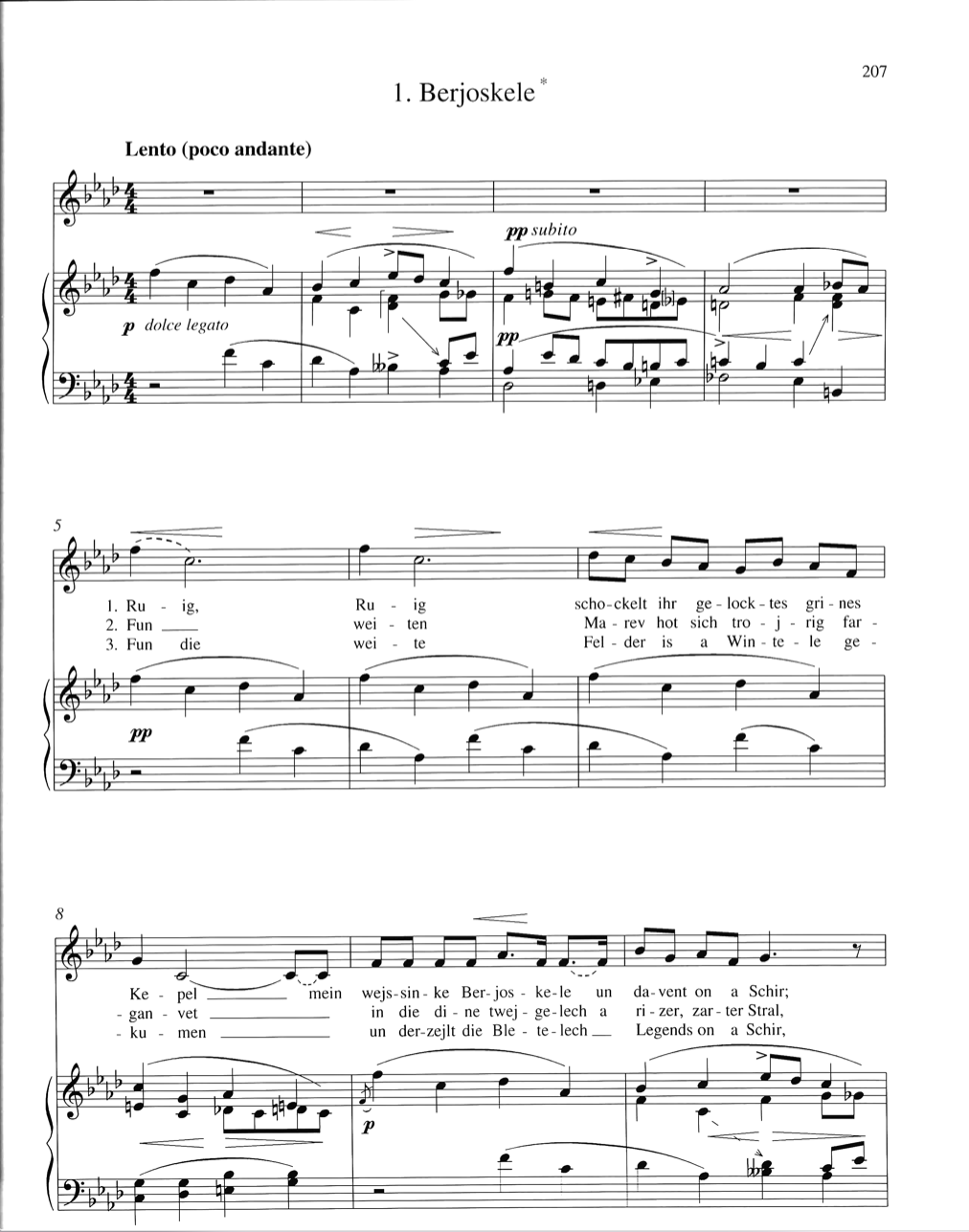
Viktor Ullmann - 3 Yiddish Songs
On Sale
$0.00
Download only for personal educational use/research.
VIKTOR ULLMANN
Three Yiddish Songs
Drei jiddische Lieder/Březulinka Op. 53
Like such other assimilated German-speaking Czech Jews as Franz Kafka and Gustav Mahler, Viktor Ullmann lived a life of multiple estrangements, cut off from Czech nationalism, German anti-Semitism, and Jewish orthodoxy.
The Three Yiddish Songs, Op. 53 were composed during his imprisonment in the Theresienstadt concentration camp. He was later transferred to Auschwitz and was killed.
The songs are based on Yiddish folk tunes and poetry from the 1930's Jüdische Liederbuch collection. The works are more complex than they seem–rich with inner voices, syncopated rhythms, and discordant harmonies, reflecting contemporary musical styles.
Ullmann combines folksong and art song under the unifying theme of loneliness and longing.
1. Berjoskele - Little Birch
A reflection within Yiddish music. Somber, longing. The singer asks a little birch tree to act as a mediator between herself and the divine by sending prayers to end her yearnings. It's a song about the estrangement of the poem’s narrator, a visitor to a village, whose prayers will not be understood by the local god. Facing the confusion of the modern world which disrupts the coming of age, the discovery of identity, and the decision to cross borders demanded by rites of passage.
2. Margarithelech - Little Daisy
A young girl, Chavele, sings carefree in the forest, and enjoys the delights of nature and of a young man who visits her.
3. A Mejdel in die Johren - A Maiden No Longer Young
The story of a no-longer-young woman being left at the altar. The wedding celebration that never happened is characterized by syncopation. The text is a morality play meant to teach young women to choose wisely when deciding on whom to marry :)
VIKTOR ULLMANN
Three Yiddish Songs
Drei jiddische Lieder/Březulinka Op. 53
Like such other assimilated German-speaking Czech Jews as Franz Kafka and Gustav Mahler, Viktor Ullmann lived a life of multiple estrangements, cut off from Czech nationalism, German anti-Semitism, and Jewish orthodoxy.
The Three Yiddish Songs, Op. 53 were composed during his imprisonment in the Theresienstadt concentration camp. He was later transferred to Auschwitz and was killed.
The songs are based on Yiddish folk tunes and poetry from the 1930's Jüdische Liederbuch collection. The works are more complex than they seem–rich with inner voices, syncopated rhythms, and discordant harmonies, reflecting contemporary musical styles.
Ullmann combines folksong and art song under the unifying theme of loneliness and longing.
1. Berjoskele - Little Birch
A reflection within Yiddish music. Somber, longing. The singer asks a little birch tree to act as a mediator between herself and the divine by sending prayers to end her yearnings. It's a song about the estrangement of the poem’s narrator, a visitor to a village, whose prayers will not be understood by the local god. Facing the confusion of the modern world which disrupts the coming of age, the discovery of identity, and the decision to cross borders demanded by rites of passage.
2. Margarithelech - Little Daisy
A young girl, Chavele, sings carefree in the forest, and enjoys the delights of nature and of a young man who visits her.
3. A Mejdel in die Johren - A Maiden No Longer Young
The story of a no-longer-young woman being left at the altar. The wedding celebration that never happened is characterized by syncopation. The text is a morality play meant to teach young women to choose wisely when deciding on whom to marry :)
